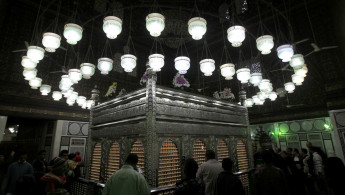Egypt closes Hussein mosque ahead of Ashura
On Tuesday, Egypt’s Ministry of Religious Endowments announced a decision to close al-Hussein Mosque in Old Cairo ahead of the Shia religious commemoration of Ashura in order to avoid potential tensions between Shia participants and Sunni hardliners.
"Sectarian religious practices will not be allowed on Ashoura or any other day," said a statement by the ministry on Tuesday.
The announcement came on the same day that at least 14 people were killed in an attack on a Shia shrine in the Afghan capital Kabul as Shia Muslims, across the world, began preparations for Ashura. Elsewhere, in Damascus, pro-regime forces closed down roads in the Syrian capital’s old city and in neighbourhoods surrounding the Sayyeda Zeinab mosque.
Ashura commemorates the death of Hussein, the grandson of the prophet Mohammad, at the hands of the Ummayad caliph Yazid's army at the Battle of Karbala (680 AD). This historical event is viewed as marking the schism of the Sunni and Shia communities.
Vulnerability of Shia community in Egypt
According to Shia tradition Hussein's head is buried in the al-Hussein mosque having been transported from Karbala, to Damascus, then to Ashkelon before arriving in Cairo.
In recent years, Egyptian authorities have closed al-Hussein Mosque during Ashura in order to prevent the risk of sectarian clashes taking place.
Some 90 percent of Egyptians are Sunni and the country’s Ministry of Religious Endowments, which presides over mosques in the country, is run according to the precepts of Sunni doctrine.
No official statistics exist for the number of Shia in Egypt, but the number is estimated at around 900,000.
Egyptian Shia have long said they face persecution in Egypt, and are apprehensive to publicly practice in the country. Under Hosni Mubarak, the Egyptian state arrested and interrogated members of the Shia community including the imprisonment of 300 Shia in 2009 without official justification.
Since Mubarak’s fall, humanitarian groups including Human Rights Watch, say persecution has continued. In one notable incident four Egyptian Shia were killed in an attack in a Giza village in June 2013 following “incitement by Salafist preachers”, according to Ahram Online.
Human Rights Watch has previously called on the Egyptian state to “publicly denounce any hate speech against Shia” in Egypt.





![Israeli forces ordered bombed Gaza's Jabalia, ordering residents to leave [Getty]](/sites/default/files/styles/image_330x185/public/2176418030.jpeg?h=a5f2f23a&itok=_YGZaP1z)

